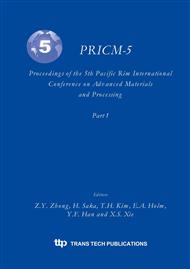p.1393
p.1397
p.1401
p.1405
p.1409
p.1415
p.1421
p.1425
p.1429
Delayed Hydride Cracking Velocity of Irradiated Zr-2.5Nb Tubes after a 30-Year Operation in the Wolsong Unit 1
Abstract:
The aim of this study is to investigate a change in delayed hydride cracking (DHC) velocity of Zr-2.5Nb tubes with fast neutron fluence (E>1MeV) and predict the DHC velocity of the irradiated Wolsong 1 Zr-2.5Nb tubes at a neutron fluence corresponding to the 30 year design lifetime. To this end, the DHC velocity were determined at temperatures ranging from 100 to 280 oC on unirradiated Zr-2.5Nb tubes and the irradiated Zr-2.5Nb tubes in the Wolsong Unit-1 to the neutron fluence of 8.9x1025 n/m2 (E>1MeV). DHC tests were conducted on the compact tension specimens charged with 34 to 100 ppm hydrogen in accordance with the KAERI DHC procedures that have been validated through a round robin test on DHC velocity of Zr-2.5Nb tubes as an IAEA coordinated research project. Irradiated Zr-2.5Nb tubes had 3 to 5 times higher DHC velocity than that of unirradiated Zr-2.5Nb tubes while the inlet region of the irradiated Zr-2.5Nb tube with the highest yield strength had a slightly higher DHC velocity compared to that of the outlet region with the lowest yield strength. From a normalized correlation of yield strength and DHC velocity of the Zr-2.5Nb tubes, the yield strength was found to govern the DHC velocity of the Zr-2.5Nb tubes irrespective of the neutron fluence and operating temperatures. The DHC velocity of the irradiated Zr-2.5Nb tubes is predicted after a 30 year operation in the Wolsong Unit 1 on the basis of an increase in the yield strength with neutron fluence and a DHC velocity dependence on the yield strength of Zr-2.5Nb tubes.
Info:
Periodical:
Pages:
1409-1414
Citation:
Online since:
January 2005
Authors:
Price:
Сopyright:
© 2005 Trans Tech Publications Ltd. All Rights Reserved
Share:
Citation:


